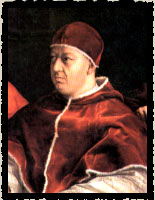 If ever a man was
produced by the Italian Renaissance it was Giovanni de' Medici. He was born at
Florence in 1475, the son of the magnificent Lorenzo. Marsilio Ficino and
Politian saw to his humanist education. Destined for the Church, he was tonsured
at the age of seven or eight and soon became abbot of several monasteries. A
cardinal at thirteen, he was pope at thirty-eight. Yet Giovanni had his troubles
too.
If ever a man was
produced by the Italian Renaissance it was Giovanni de' Medici. He was born at
Florence in 1475, the son of the magnificent Lorenzo. Marsilio Ficino and
Politian saw to his humanist education. Destined for the Church, he was tonsured
at the age of seven or eight and soon became abbot of several monasteries. A
cardinal at thirteen, he was pope at thirty-eight. Yet Giovanni had his troubles
too.
His family was expelled from Florence in 1494. Appointed legate in Romagna by
Julius II, Giovanni was taken prisoner by the French in the War of the Holy
League. But then fortune's wheel spun. The Medici recovered control of Florence
in 1512, and the very next year Giovanni entered the conclave a dark horse to
emerge as Pope Leo X. Leo faced the crushing responsibility of spiritual
leadership with a light heart. He loved shows and games, and many a play and
ballet was performed for the Pope's amusement. A keen sportsman, Leo spent much
time hunting. He was careless of the morals of the humanists he patronized as
long as their Latin was Ciceronian. Yet Leo had no scandal in his own life,
before or after becoming pope. He was charitable, said his prayers regularly,
and even fasted three times a week.
His open-handed extravagance made Rome a happy hunting grounds for humanists,
but it so seriously embarrassed the papal treasury that Leo was forced to stoop
to unworthy devices to secure necessary funds. In politics Leo played a shifty
game without much ability and usually reaped only embarrassment. He completed
the Fifth Lateran Council called by Julius. But, though excellent reform decrees
had been passed, little enough came of them. Leo's most famous achievement was
the Concordat of Bologna, an agreement with Francis I of France signed in 1516
which put an end to the semischismatical policy intermittently followed by the
French since the Council of Basel. This agreement, which allowed the king to
name bishops and abbots, gave him so great a stake in French church wealth that
greed would not tempt the French monarchs, as it did others, to leave the Church
so that they could confiscate its wealth. These advantages, however, were dearly
bought, for the concordat left an open avenue to corruption in the French
church. Leo X had been elected by the younger cardinals, and these made so many
demands on him that he could not satisfy all. One of the disgruntled
dignitaries, Cardinal Petrucci, plotted to poison the Pope. Leo discovered the
plot, had Petrucci executed, and then at one sitting created thirty-one new
cardinals, a wise step which ensured a loyal college. Leo had appointed Raphael
to proceed with the building of St. Peter's, but lack of funds forced the great
artist to chafe in idleness.
The Pope granted an indulgence to all who under the usual conditions contributed
to the building of the basilica. Tetzel, preaching this indulgence in Germany,
stirred a stormy Augustinian to challenge him and indulgences on October 31,
1517. From 1517 to 1521 Martin Luther drifted into open rebellion against the
Catholic religion. Leo was quite patient with him, but at last in 1520 he
condemned Luther's errors by the bull "Exsurge Domine." Condemnations were not
enough. By December 1, 1521, when Leo X died, Germany was aflame. It was the
time's misfortune that when the Church needed a Hildebrand on the papal throne
all it got was a Medici. .
Excerpted from "Popes
Through the Ages" by Joseph Brusher, S.J.

